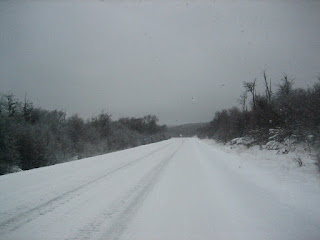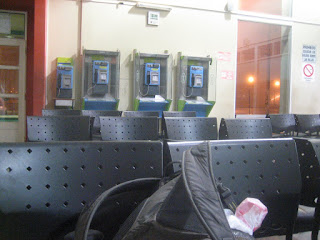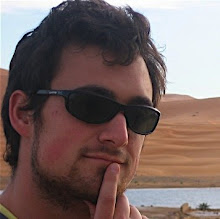
I recently spent six days on the road, hitchhiking from Ushuaia, in Tierra del Fuego, to El Bolson, in the Northern part of Argentine Patagonia. My original hope was to hitch from Ushuaia to Bolivia, but I found getting rides to be harder than expected in some places and, on two occasions, had to ultimately take a bus. Hitching in Patagonia is neither easy nor comfortable, but, having talked to other travelers, I knew it was at least possible and had to try.
I logged over 2000 km of Northwesterly travel, and ended up splitting the distance between hitchhiking and buses. I rode in one long-haul cargo truck, one truck carrying pipes for oil rigs, four pick-ups, and two cars. The drivers were as diverse as their vehicles: Raul owns sawmills in Brazil, works as a part-time translator of Portuguese for the government, and drives for fun; one guy who's name I didn't get was just driving an unrelated old woman to her hometown so she could vote in congressional elections; Dario and his son Felix were driving to Rio Gallegos to check in on the family business, which maintains gas and oil distribution networks; Sergio drives a truck carrying equipment to and from the oil derricks outside of Comodoro Rivadavia; Pedro is a soil environmentalist working for an American oil company; the other guy who's name I didn't get works for a state-run agricultural institute; Sebastian made a bundle when the Argentine peso collapsed and, despite being trained as a lawyer and holding a government job, makes his money renting houses and selling produce from his land; the other Pedro, who saved me during the most perilous of my waits, works for the government and was traveling to Bariloche, consistently doing over 100 mph, to visit a mysterious "amiga."
Conversations, obligatory in such situations, were easy and interesting, although, topically speaking, they became somewhat repetitive: our backgrounds, U.S. and Argentine politics, football, the weather (my fault), and Swine Flu. Instead of being tiresome, the common themes allowed me to draw some conclusions as to what might be the "Argentine opinion" on a certain topic: All are frustrated with Argentine politics, most dislike Chavez (their president is cozying up to him), all like Obama, most think the climate is changing, most wanted the U.S. to beat Brazil in the Confederations Cup, and all think the current fuss about Swine Flue in Argentina is a misguided campaign fueled by a self-interested government and press.
I was surprised to uncover a certain self-loathing of Argentina in almost every conversation. Sergio grew up in a working family and only studied through second-grade, yet travels in Argentina and Chile with his family, when he can, and, judging by our conversation, thinks deeply about the world beyond his trucking job. He abhors what he perceives as Argentine disinterest in culture and learning and thinks it puts the country at a disadvantage. Raul, as we discussed the poor maintenance of the icy road between Ushuaia and Rio Grande, told me about the entrenchment of corruption in local politics and mused that "Argentina would be a wonderful country if it were not for the Argentines." In answering my question as to why Argentina exports 100% of its crude oil and imports refined products, Pedro asserted, quite sincerely, that Argentines are lazy. A supervisor at the oil company, he told me that he can always count on the Bolivians and Paraguayans to have completed their assignments, and then some, whereas the Argentines can be counted on to spend half of their time working and half drinking mate. Each conveyed the sentiment that Argentina has not lived up to its potential, and, from an economic standpoint, may be irreparably broken.
Outside of the cars, I did a lot of walking and a lot of waiting. The best place to wait for rides is at the final exit of a city. Getting there sometimes involved a walk of several kilometers which, with a 60+ pound pack on my back, became quite a workout. On several occasions I did the walk out and, in defeat, back in to town. Twice, I was picked up within moments of reaching my spot, but in most places I spent several hours standing on the side of the road. I did plenty of thinking, but the hours were long and thinking became dangerous, so I turned to music. The iPod saved my life.
Rio Gallegos was the big distaster. A transportation and shipping hub, it is the first city in continental Argentina as you travel North from Tierra del Fuego. Despite the volume of long-haul traffic and the fact that I spent the better part of thirty-six hours thumbing on the roadside and asking around the truckstop, I could not get a ride. Battered by the cold wind and losing hope, I gave in on second day and bought a bus ticket.
The gas station in Gallegos was near the bus terminal, and, mostly for convenience, I slept two nights in the terminal waiting area. The first night I shared the room with another hitchhiker, an Argentine, and slept rather fitfully as I kept expecting to be kicked out. Amidst my tossing and turning, a cute little black dog showed up to sleep under my seat. I woke from my half-sleep some time later to find that he had taken my gloves out of my boots and chewed a hole in one of them. More distraught than angry, I gave him a hard smack. His puppy dog eyes made me regret it, and, making sure to stash my belognings carefully in my bag, I let him sleep with me the next night.
The biggest obstacle was the cold, with temperatures in the daytime at or below freezing. Moreover, because the sun does not really come out until after 9 AM and I wanted to get early starts, I often began my walk in the dark. It is hard to stay warm standing on the side of the road, no matter what you wear, so I paced, jumped, clapped, jogged, and rattled my body like an insane person.
The act of "thumbing" became problematic in and of itself. I wore a thin pair of liner gloves because my thicker ski gloves did not allow for an adequate extension of the thumb. Better than nothing, these gloves nevertheless left my fingers almost numb and I would sometimes have to abort the thumb as a car passed to tuck it underneath my fingers. Aside from the cold, I actually developed a slight case of tendinitis at one point and had to change thumbing form to avoid the pain.
Simple as it seems, hitching took some learning and some getting used to. Aside from having to learn where to wait, who to look for, and how to ask around, I had to overcome a subtle sense of embarassment. At it's essence hitchhiking is begging, something which is, to me, completely foreign and decidedly uncomfortable. At the start I would reluctantly and timidly stick out my thumb, always a split second too late to avoid outright rejection. After a few short hitches in and around Ushuaia, however, I warmed up to it, lost my inhibitions, and boldly begged everyone that passed.
Even once I became accustomed to thumbing, I had trouble looking drivers in the eye. I did not want to see the disgust and disapproval I imagined to be emanating from behind the wheel. After a while, though, I began to feel ownership of my role as a hitchhiker and to even take some pride in it. I started to look at the drivers because to not look at them is to let them off easy. "Not picking me up is one thing," I thought, "but at least acknowledge me." Another benefit to looking at people is that many people that don't stop will visually apologize. For example, many drivers will look at you and gesture that they are heading somewhere else, or simply wave to acknowledge your wait and apologize for the pass. Instead of saying "I reject you," they are saying, "I really would like to help you, but, for some reason that is out of my control, I can't, and I wish you the best of luck." Even though you are still out in the cold, these looks are great for morale.
All told, the scorecard is not that impressive: I saved about $60 dollars on transportation costs, but added more than four days to my travel time (with different luck, however, I could have saved double the amount in half the time). I slept very little, walked a lot, and shivered more. At a couple points in the trip I was quite distraught, wanting to give up quickly but feeling as I did that I owed it to myself to keep trying. When I finally arrived to El Bolson I was so exhausted and dirty that I was pretty worthless for the next two days. As the days wear on, however, it is harder for me to remember the bad times and easier for me to remember how, every single time I got out of the car, the driver shook my hand, looked me in the eyes, smiled heartily, and wished me good luck. A few of the drivers even hugged me.
I would now advocate hitchhiking as a personal exercise, something akin to shaving your head completely, fasting, or running a marathon. Not only do you learn about yourself, and your limits, but you pick up a little bit of empathy along the way. I certainly did not set out on the hitchhiking trip with grand visions of a social experiment, but I did, on this selfish endeavor, learn a little bit more about what it's like to go without. Key for me is the idea that you don't have to go out of your way to make someone's day. Sometimes, all you have to do is stop.








You are the best begger i know Lol, good man
ReplyDeleteReally nice story and very recognizable!
ReplyDelete